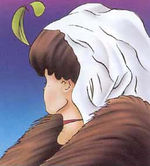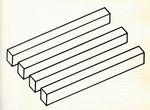Difference between revisions of "Sermon for February 28th, 2016"
| Line 50: | Line 50: | ||
Meanwhile, on earth, Job has all these bad things happen to him. His three friends come to comfort him, and together they all set out trying to answer the question, why did all these bad thigns happen to Job? Was it something he did? Something he didn't do? Was God torturing him for no reason? Or was it something else altogether? Essentially, all of them are seeking the truth. | Meanwhile, on earth, Job has all these bad things happen to him. His three friends come to comfort him, and together they all set out trying to answer the question, why did all these bad thigns happen to Job? Was it something he did? Something he didn't do? Was God torturing him for no reason? Or was it something else altogether? Essentially, all of them are seeking the truth. | ||
| − | I suspect there's one more person seeking truth as well, and that's the poet, the author of the story. | + | I suspect there's one more person seeking truth as well, and that's the poet, the author of the story. Job is certainly the work of a skilled writer, and it bears all the marks of a fable, a parable like the story of the Good Samaritan, or the Prodigal Son. It was written not as factual history, but rather as a story to make a point. And as I hinted at last week, I think it was written as a counter argument, a minority report, to the prevailing tradition of the time. It's an idea that permeates most of the Bible: Right is right, wrong is wrong; same with good and evil, truth and lies, and it's easy as daylight to tell the difference between the two. |
| + | |||
| + | That's a great theology, a simple theology, and there are a lot of people (and churches) that find it very appealing. But it kind of falls on its face as soon as you walk out the church doors and into a world that is complicated, nuanced, with a whole lot of gray areas and challenges where the "right thing to do" isn't always clear, and people on both sides of an issue passionately believe their perspective is true! | ||
| + | |||
| + | I suspect the author of Job lived in a world like that, too, and probably got told one too many times | ||
Revision as of 19:43, 27 February 2016
Job 34:1-15
1“Hear my words, you wise men,
and give ear to me, you who know;
3 for the ear tests words
as the palate tastes food.
4 Let us choose what is right;
let us determine among ourselves what is good.
5 For Job has said, ‘I am innocent,
and God has taken away my right;
6 in spite of being right I am counted a liar;
my wound is incurable, though I am without transgression.’
7 Who is there like Job,
who drinks up scoffing like water,
8 who goes in company with evildoers
and walks with the wicked?
9 For he has said, ‘It profits one nothing
to take delight in God.’
10 “Therefore, hear me, you who have sense,
far be it from God that he should do wickedness,
and from the Almighty that he should do wrong.
11 For according to their deeds he will repay them,
and according to their ways he will make it befall them.
12 Of a truth, God will not do wickedly,
and the Almighty will not pervert justice.
13 Who gave him charge over the earth
and who laid on him the whole world?
14 If he should take back his spirit to himself,
and gather to himself his breath,
15 all flesh would perish together,
and all mortals return to dust.
Truth in the Book of Job
So we've been talking about virtues in the Book of Job, and we've already covered Love and Beauty. Next week we'll tackle Wisdom, but today we're going to talk about Truth. There's a great moment in the gospel of John where the Roman Governor, Pontius Pilate, is questioning Jesus, trying to figure out who he is and why he has come. Jesus tells Pilate, "For this I came into the world, to testify to the truth.” Pilate responsds, “What is truth?” Interestingly, Jesus never answers.
What is truth? We'll get to our text and the story of Job in just a moment, but first, a few digressions.
 Which of these two blocks is lighter?
Which of these two blocks is lighter?
 Do you see an old woman or a young woman?
Do you see an old woman or a young woman?
 Finally, is it possible to fit a round peg in a square hole?
Finally, is it possible to fit a round peg in a square hole?
All of these examples are crucial to understanding truth in the Book of Job. The Book of Job begins with a debate in the heavenly council between God and Satan: They want to know if all of Job's legendary piety, all of his character and righteousness...is for real, or just an act? Essentially, both God and Satan are, in their own way, seeking out the truth.
Meanwhile, on earth, Job has all these bad things happen to him. His three friends come to comfort him, and together they all set out trying to answer the question, why did all these bad thigns happen to Job? Was it something he did? Something he didn't do? Was God torturing him for no reason? Or was it something else altogether? Essentially, all of them are seeking the truth.
I suspect there's one more person seeking truth as well, and that's the poet, the author of the story. Job is certainly the work of a skilled writer, and it bears all the marks of a fable, a parable like the story of the Good Samaritan, or the Prodigal Son. It was written not as factual history, but rather as a story to make a point. And as I hinted at last week, I think it was written as a counter argument, a minority report, to the prevailing tradition of the time. It's an idea that permeates most of the Bible: Right is right, wrong is wrong; same with good and evil, truth and lies, and it's easy as daylight to tell the difference between the two.
That's a great theology, a simple theology, and there are a lot of people (and churches) that find it very appealing. But it kind of falls on its face as soon as you walk out the church doors and into a world that is complicated, nuanced, with a whole lot of gray areas and challenges where the "right thing to do" isn't always clear, and people on both sides of an issue passionately believe their perspective is true!
I suspect the author of Job lived in a world like that, too, and probably got told one too many times

